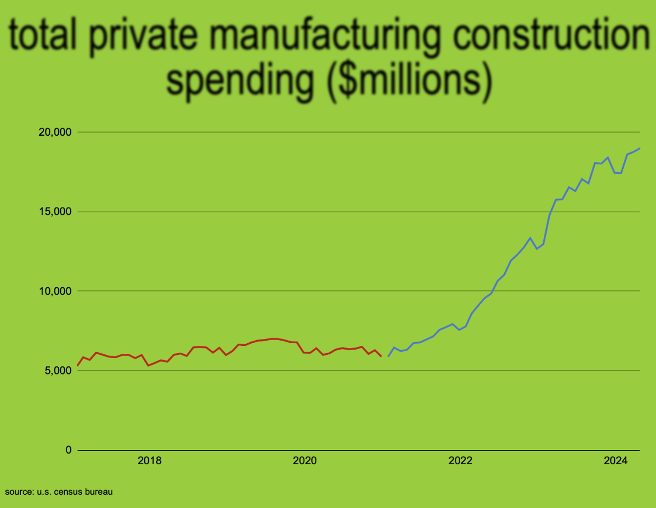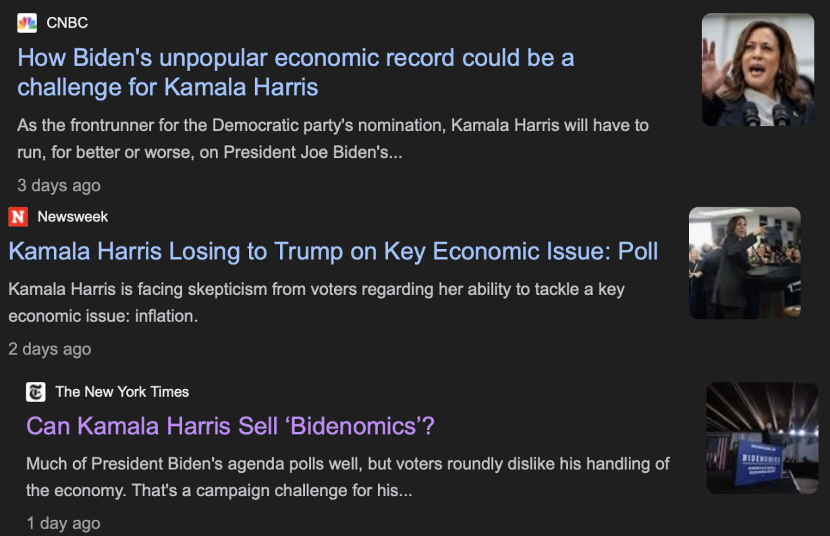It’s the Economy, Brats
July 27, 2024
By Elizabeth Pancotti
Fireside Stacks is a weekly newsletter from Roosevelt Forward about progressive politics, policy, and economics. We write on the latest with an eye toward the long game. We’re focused on building a new economy that centers economic security, shared prosperity, and rebalanced power.
By nearly every account, the economic picture in the US is one for the Louvre. GDP growth exceeded expectations this Thursday, prices fell for the first time in four years in June, and 1.4 million jobs have been created in just the first half of this year. Last week, the Washington Post’s Heather Long and Aden Barton tallied economic wins under Biden and Trump’s tenures. Among the 17 measures, they give Biden the advantage for at least 11, including economic growth, gains for Black workers, and an explosive boost in domestic manufacturing.

The strong economy we have today didn’t just fall out of a coconut tree; it exists in the context of all in which it lives (Bidenomics) and what came before it (neoliberalism). Biden’s approach to the economy moved beyond decades of failed trickle-down approaches and market fundamentalism, instead marshaling the power and investments of the government in service of American workers and families. Unsurprisingly (to us, though it took some time for others to see the light), it’s worked.
But the job isn’t finished. To make this shift last, Democrats have to sell what they’ve done so far and provide a vision for how they’ll build on it. The playbook for how to do this successfully comes from down-ballot races.
Senator Sherrod Brown, up for reelection this fall, is running ads claiming he’s “cracking down on the companies who rip off Ohio” and highlighting the tens of thousands of manufacturing jobs that are flowing to the state as a result of Biden’s industrial policy programs. Wisconsin Senator Tammy Baldwin’s ads feature the Buy American provisions she secured in Biden’s industrial policy investments, and New Jersey Senator Cory Booker stumped for Baldwin saying “I don’t think there’s any leader in the Senate who has brought home more infrastructure money that’s creating jobs.” Josh Stein, running for governor in North Carolina, highlights his tenure as attorney general in which he’s “fought against predatory corporations that were driving up prices.” Stein puts it best, perhaps, when he says “the economy is strong and growing, but not everyone is benefiting from that growth” and vows to “invest in our people.” Pennsylvania Senator Bob Casey’s reelection platform highlights our imbalanced tax code and backs repealing “massive tax cuts for the ultra-wealthy and big corporations passed in 2017, and enacting tax policies to rebuild the middle class, reduce child poverty, lower the costs of child care, and support working parents and opportunities for all Americans.”
Up and down the ballot, Democrats are running campaigns on the strength of our economy and empathy for where families are still struggling, and selling the down payment they’ve made on growing the middle class. And it’s working.
Prior to this week’s swap in the presumptive Democratic nominee for president, down-ballot Dems’ prospects were significantly higher than President Biden’s. Among likely voters, Baldwin was polling nine points ahead of her opponent, while Biden was up just two. Brown was up six points, while Biden was down 10. Registered voters favored Casey by 11 and Stein by six, while Biden trailed Trump by at least four in both states.
Voters blamed Biden for the imperfections in the economy, and gave him little credit for its strongest features. Despite considerable improvement in inflation and one-after-another blockbuster jobs reports, voters’ approval of Biden’s handling of the economy between November and May improved by just four points. Fifty-one percent of voters said they felt that they were worse off financially since Biden took office, and 49 percent said they thought Biden’s economic policies had hurt the economy. Politico reported in May that “Biden and his team have yet to find their footing on the economy and . . . one of their biggest campaign hopes—that a strong economic outlook would rally voters behind Biden—may not actually materialize.”
Critics throughout the party encouraged Biden to reframe his messaging to sell the economy to voters. A few months ago, Brown urged Democrats to do more to communicate to voters the strength of the economy, what the Biden-Harris administration has done for it, and—when it comes to things that are still frustrating for American families, like high prices—the role unfettered corporations are playing. SEIU President April Verrett told the New York Times last month that condemning big corporations is “a winning message for Democrats, and clearly Bob Casey, who’s doing better in the polls than the president, is proving that it’s the winning message.” Bernie Sanders urged Biden in the final weeks of his reelection bid to pitch the American people on a 100-day agenda that included demanding billionaires pay their fair share of taxes. Ron Klain, the president’s former chief of staff, accused Biden of “talking too much about bridges,” and emphasized that the “president’s most effective economic message is . . . compassion for the [pinch] of family budgets and his agenda to bring costs down and raise incomes.”
Following President Biden’s campaign withdrawal announcement this weekend, headlines immediately emerged about whether presumptive nominee Vice President Kamala Harris can sell the strength of the economy better than Biden.

First signs point to yes, she can. Blueprint pollsters who surveyed registered voters just as Harris announced her bid for president this week found that she and Trump are tied 50-50 when voters were asked who would do a better job bringing down prices and that “voters do not hold her accountable for Biden’s perceived failures on inflation.” As I told the New York Times, “We don’t say ‘Harris-flation,’” or as my boss Felicia Wong put more eloquently to the paper of record, “she will be able to make a more nuanced argument about the drivers of inflation.”
Harris has the opportunity (in a very narrow window of time) to make a pitch to the American people on the economy we have—and the economy we can have.
As Sanders told The Hill yesterday, “the views of working-class voters of Michigan, Pennsylvania, Wisconsin are just so fundamental to the course of this election cycle.” The Biden-Harris administration has delivered for those voters: According to the White House, the administration has created 1.13 million jobs and catalyzed more than $38 billion in private sector investment in just those three states. The administration has lowered prescription drug costs for 6.4 million Medicare beneficiaries, is replacing lead pipes for thousands of residents, and has approved more than 200,000 student loan borrowers for debt cancellation. It’s up to Harris to remind them of the role she’s played, and tell them what more she’ll do.
The good news, for her and the country, is that we have a playbook. And Harris seems to be pulling from it already. At her first rally after announcing her bid for president, the audience erupted with boos when she exclaimed that Donald Trump “intends to give tax breaks to billionaires and big corporations and make working families foot the bill.” Harris continued, “America has tried these failed economic policies before, but we are not going back.” Wisconsin voters agreed, chanting “we are not going back!”
Harris, and down-ballot Democrats, have the opportunity over the next 101 days to pitch their vision for the country and the economy—one where we invest in people, rein in corporations, create equitable growth, and tax the wealthy. One where we move beyond the failures of neoliberalism that exploded economic inequality, hollowed out American communities, and consolidated economic power. It’s a popular one. They should embrace it.
If You Ask Eleanor
“Instead of serious depression we are in a period of inflation, with high costs, high earnings and high wages. This must, of course, be changed, but it is a question of how it shall be done. Most of the social advances have come under the Democratic party.”
– Eleanor Roosevelt, My Day (October 14, 1952)


